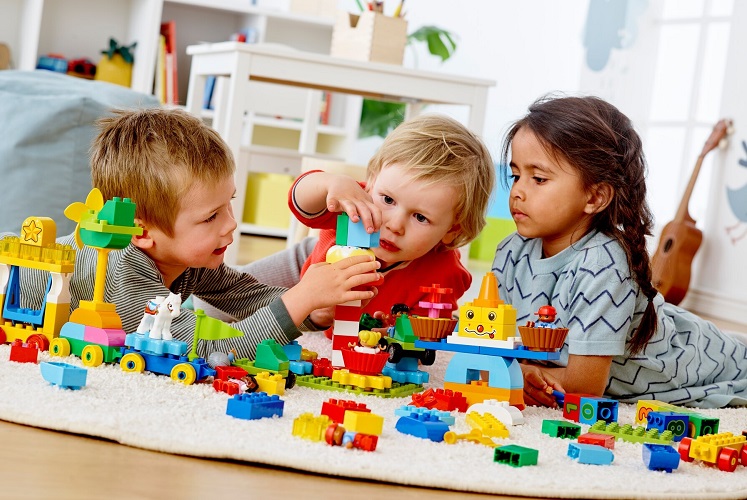10 Best Strategies for Balancing a Multi-Child Household
In a multi-child household, routines are essential. Set up bedtime rituals for rest, mornings for positivity, meals for health, and homework for organization. Encourage teamwork with activities and unity. Make time for each child individually to deepen bonds. Communication is important. Listen actively, promote openness, and teach problem-solving. Delegate tasks based on age to build responsibility. Maintain fairness and positive sibling connections. Self-care is critical. Prioritize mental health and seek help when needed. By implementing these strategies, you can create a harmonious and organized household that benefits everyone involved.
Key Takeaways
- Establish consistent routines for bedtime, meals, homework, and mornings.
- Encourage teamwork through supportive activities and collaboration.
- Prioritize individual quality time with each child for strong bonds.
- Foster effective communication and conflict resolution skills.
- Delegate age-appropriate responsibilities to instill teamwork and life skills.
Establish Consistent Routines

To successfully manage a multi-child household, it’s essential to establish consistent routines that provide structure and predictability for both you and your children. Bedtime routines play an important role in ensuring your little ones get the rest they need. Establishing a calming wind-down period before bed can help signal to your children that it’s time to sleep. This may involve activities like reading a bedtime story or having a quiet chat.
Morning routines are equally important in setting a positive tone for the day ahead. Establishing a morning routine that includes tasks like getting dressed, brushing teeth, and having breakfast can help streamline the morning chaos.
Mealtime routines promote healthy eating habits and provide an opportunity for the family to come together. Setting regular meal times and involving children in meal preparation can make mealtimes more enjoyable.
Homework routines can help your children stay organized and focused on their schoolwork. Designating a specific time and quiet space for homework can improve concentration and productivity.
Encourage Teamwork and Cooperation

Encouraging teamwork and cooperation among your children fosters a supportive and harmonious atmosphere within your multi-child household. Teamwork challenges are inevitable, but they present valuable opportunities for growth. Encouraging collaboration starts with setting a positive example yourself. Demonstrating teamwork in your daily interactions can inspire your children to do the same.
Sibling cooperation can be nurtured through activities that require mutual effort, such as cleaning up together or working on a shared project. Praise and acknowledge moments of successful teamwork to reinforce this behavior positively.
Building unity among your children can be achieved by fostering a sense of camaraderie through team-based games or tasks. Emphasize the importance of supporting each other and celebrating collective achievements.
Remember that teamwork and cooperation are skills that develop over time, so be patient and consistent in your efforts. By promoting a culture of collaboration in your household, you’re laying the foundation for strong sibling bonds and a more harmonious family dynamic.
Prioritize Individual Quality Time
Fostering individual quality time with each child is essential for nurturing their unique personalities and strengthening your bond with them. Quality time bonding allows you to focus on each child’s interests, concerns, and needs, providing them with individual attention that fosters a deeper connection.
While managing a multi-child household may seem overwhelming, carving out dedicated one-on-one moments with each child is vital for their emotional well-being and for building strong sibling relationships.
Setting aside time for each child helps them feel valued and understood, enhancing their self-esteem and sense of security within the family unit. Whether it’s reading a book together, going for a walk, or engaging in a favorite hobby, these shared experiences create lasting memories and meaningful connections.
Foster Effective Communication

Effective communication is the cornerstone of maintaining harmony and understanding within a multi-child household. Active listening is key to fostering connections and resolving conflicts. When your children feel heard, they’re more likely to express themselves openly and work towards solutions.
Encourage them to communicate their feelings and thoughts, while also setting boundaries that promote respect and consideration for one another.
Conflict resolution and problem-solving skills are essential in a household with multiple children. Teach your kids how to address disagreements calmly, listen to each other’s perspectives, and find compromises that satisfy everyone involved.
Delegate Age-Appropriate Responsibilities
Assigning tasks based on your children’s ages and abilities can help instill a sense of responsibility and teamwork within your multi-child household. Chore assignments should be tailored to each child, considering what they’re capable of handling. Younger children can be responsible for simple tasks like putting away toys or setting the table, while older children can take on more complex chores like laundry or meal preparation.
By delegating age-appropriate tasks, you not only lighten your load but also teach valuable life skills.
Incorporating these responsibilities into daily routines can make them feel like a natural part of the day. Encouraging sibling teamwork can foster a sense of camaraderie and shared responsibility among your children. This can lead to a more harmonious household where everyone contributes towards common goals.
Embrace Flexibility and Adaptability
To navigate the dynamic challenges of managing a multi-child household, it’s essential to embrace flexibility and adaptability in your daily routines.
Adaptability allows you to adjust quickly to the ever-changing needs and schedules of your children, fostering resilience in both them and yourself. Flexibility is key in handling unexpected situations, creating a more harmonious environment for everyone.
Incorporating teamwork within your family unit can greatly enhance adaptability. Encouraging your children to work together and support each other can lighten the load on you as a parent and promote a sense of unity among siblings.
Maintain Fairness and Equity

When managing a multi-child household, ensuring fairness and equity is key to maintaining harmony.
Providing equal opportunities for all your children fosters a sense of inclusivity and respect.
Consistent rules and rewards help set clear expectations and prevent feelings of favoritism or unfair treatment.
Equal Opportunities for All
Ensuring equal opportunities for all your children in a multi-child household is essential for maintaining fairness and equity within the family dynamic. Sibling dynamics can often create challenges in achieving this balance. Each child may have different needs, strengths, and weaknesses, leading to potential feelings of favoritism if not managed carefully.
Acknowledging and respecting these individual differences is key to fostering a sense of equality among siblings.
To navigate through these complexities, it’s vital to take into account each child’s individual interests. Encouraging them to pursue activities they’re passionate about can help them feel supported and valued. Whether it’s sports, arts, academics, or other hobbies, providing opportunities for each child to explore their interests can promote a sense of fairness within the family.
Consistent Rules and Rewards
Maintaining consistent rules and rewards is vital in fostering fairness and equity among siblings in a multi-child household. By setting clear boundaries and adhering to consistent discipline, you create a sense of structure that helps children understand expectations and promotes harmony within the family dynamic. Positive reinforcement plays an important role in encouraging good behavior and creating a positive environment where each child feels valued and appreciated.
Consistency is key when it comes to implementing rules and rewards. Make sure that consequences are fair and applied uniformly to all children to avoid any feelings of favoritism or injustice. By upholding consistent standards, you demonstrate to your children that fairness is a fundamental principle in your household.
Remember to communicate openly with your children about the rules and expectations. Encourage them to participate in discussions about family guidelines, reinforcing a sense of ownership and responsibility. By maintaining a balance between rules and rewards, you create a supportive and equitable environment where each child can thrive.
Cultivate a Positive Sibling Relationship

To foster a positive sibling relationship in your multi-child household, prioritize open communication and encourage mutual respect among your children. Sibling bonding and conflict resolution are essential components in building trust and empathy skills within your family dynamics.
Encourage your children to spend quality time together, engaging in activities they all enjoy. This shared time can help strengthen their bond and create lasting memories.
When conflicts arise, teach your children constructive ways to resolve them. Encourage them to express their feelings calmly and listen actively to each other. By fostering open communication, you can help your children understand each other’s perspectives and work towards solutions together.
Modeling empathy and understanding in your own interactions can also positively impact how your children relate to one another. Show them the importance of kindness, patience, and forgiveness.
Practice Self-Care and Patience
It’s important to remember that taking care of yourself isn’t selfish, but essential for maintaining a healthy and harmonious multi-child household.
By prioritizing your mental health, you’ll be better equipped to handle the challenges that come with raising multiple children.
Cultivating a calm environment starts with practicing patience and showing yourself grace during the inevitable chaotic moments.
Prioritize Mental Health
Regularly prioritizing your mental health through practices like self-care and patience is essential for effectively managing the dynamics of a multi-child household. Setting self-care boundaries is vital. Allocate time for yourself, whether it’s a quiet cup of tea before the kids wake up or a brief walk alone.
Engage in mindfulness practices to stay present and reduce stress. Coping strategies like deep breathing exercises or journaling can help you navigate the challenges that come with juggling multiple children.
Stress management techniques are key to maintaining your mental well-being. Identify stress triggers and develop a plan to address them. Delegate tasks to your children or partner to lighten your load. Remember, it’s okay to ask for help when needed.
Practice patience with yourself and your children. Understand that not every moment will be perfect, and that’s okay. Be kind to yourself, and don’t hesitate to seek support from friends, family, or a therapist. Prioritizing your mental health isn’t selfish—it’s necessary for creating a harmonious environment for your family.
Cultivate Calm Environment
How can you create a calm environment in your multi-child household through the practice of self-care and patience?
Balancing the needs of multiple children can be overwhelming, but by prioritizing self-care and patience, you can cultivate a peaceful atmosphere for your family.
Start by establishing a calming bedtime routine that includes activities like reading a story or listening to soft music to help your children unwind and prepare for sleep. Consistency in bedtime rituals can signal to your children that it’s time to wind down, promoting a sense of tranquility in the household.
Additionally, encourage peaceful playtime by providing structured activities that promote cooperation and positive interactions among siblings. Setting clear boundaries and expectations during playtime can reduce conflicts and create a harmonious environment for your children to enjoy each other’s company.
Remember to practice patience with yourself and your children, understanding that maintaining a calm environment takes time and effort.
Seek Support and Community

Handling the daily challenges of managing a multi-child household can be made easier by connecting with other parents, friends, or local community groups. Parenting groups offer a safe space to share experiences, tips, and resources with like-minded individuals who truly understand the joys and struggles of raising multiple children.
Organizing playdates not only gives your kids a chance to socialize but also allows you to connect with other parents in a casual setting.
Online forums are another fantastic resource where you can seek advice, vent your frustrations, and find solidarity with parents facing similar situations. Engaging in these virtual communities can help you feel less isolated and provide a platform to exchange valuable insights.
Attending family events in your community can also be a great way to meet other families, form connections, and create a support network. These events offer opportunities for both parents and children to interact, fostering a sense of belonging and camaraderie.
Frequently Asked Questions
How Do I Handle Sibling Rivalry and Jealousy Effectively?
Handling sibling rivalry and jealousy effectively involves building empathy by acknowledging feelings, setting boundaries to address conflicts, encouraging communication to express emotions, and fostering teamwork through collaborative activities. Consistent support and positive reinforcement can strengthen sibling relationships.
What Can I Do if One Child Feels Neglected?
When one child feels neglected, it’s important to communicate openly with them about their feelings. Set boundaries to guarantee fairness and provide quality time with each child. Offer individual attention to address their needs and reinforce their importance.
Is It Normal for Siblings to Have Different Interests?
Yes, it’s completely normal for siblings to have different interests. Embrace these differences as they contribute to individual growth. Encouraging diversity within the family fosters a sense of acceptance, understanding, and respect for each other’s uniqueness.
How Can I Address Conflicts Between Siblings Peacefully?
When addressing conflicts between siblings, try conflict resolution techniques like active listening and compromise. Teach empathy by encouraging them to see each other’s perspectives. Consider sibling mediation to facilitate peaceful communication and foster better understanding.
What if One Child Consistently Refuses to Help With Chores?
When one child consistently refuses chores, communicate calmly their importance and fair distribution. Offer choices for tasks and consequences for noncompliance. Encourage teamwork and negotiation to find solutions together, fostering responsibility and cooperation in the household.
Conclusion
Remember, balancing a multi-child household can be challenging, but with patience, communication, and a focus on teamwork, you can create a harmonious environment for your family.
By implementing these strategies, you can foster strong sibling relationships, encourage individual growth, and maintain your own well-being.
Remember to prioritize self-care and seek support when needed.
Embrace the chaos and cherish the moments of love and laughter that come with raising multiple children.
You’ve got this!

Hey there! 👋 I’m a proud mom and passionate writer, sharing my parenting journey. 📝 Join me as I navigate the ups and downs of motherhood, offering tips, advice, and a sprinkle of humor along the way. 🌟







